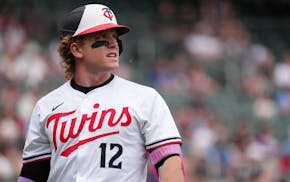In her 11th season, Kayla McBride is the most senior member of the Lynx. She has seen both the growing and the growing pains of the WNBA over the last decade.
She started her career with the San Antonio Stars, which began as the Utah Starzz and are now the Las Vegas Aces. She experienced franchise instability. She knows what it's like to sit on the tarmac in the middle of back-to-back Southwest Airlines flights.
She remembers sitting on the Lynx's charter flight to Seattle back on May 13.
"I was like, 'This is for the Seimone Augustus and the Danielle Adams,'" said McBride, 31. "This is for the players I grew up playing with when I was a young 'un. This is for them. There was a trail blazed. If those players hadn't done that, we wouldn't have this. You think about stuff like that."
There are a million metrics that show how the WNBA is growing. Ticket sales are up, almost double in some towns. Every team is on track for record attendance. Big-buck sponsors are lining up, TV ratings are rising, franchise valuations are soaring.
There is no question the influx of a rookie class led by Indiana Fever guard Caitlin Clark has been an accelerant to a growing fire. Earlier this season Lynx coach Cheryl Reeve said rookies like Clark had turned a rising wave into a tsunami.
There is also no question the difficulty some rookie stars face has opened eyes for many new fans realizing just how competitive this league is.
But much of that is just numbers, metrics, big picture.
Which begs the question: how does this feel to those who have sneakers on the ground?
"You can definitely feel it," Lynx star Napheesa Collier said. "Just the level of engagement. The fans at the games, how much people are talking about the league. Just all across the board, you can feel it."
WNBA popularity grows
Collier goes to her timeline on the X platform after games and it's filled with reactions and opinions, both positive and negative.
"It's really cool to see that," she said. "It's different than when I was a rookie. I mean, you could really feel it in the last two years that interest in women's basketball just exploded, really ever since the Sedona Prince video. It feels like it really blew the lid off things."
Prince was playing for Oregon in 2021 when she posted a video exposing the disparity in facilities for the men's and women's NCAA tournaments.
Interest was growing even before players like Clark galvanized fandom at the college level. Ratings were already rising. A year ago, looking to raise funds for a new practice facility, the Seattle Storm franchise was valued at a rather amazing $151 million.
But again, those are just numbers.
Lynx guard Courtney Williams has played in Connecticut, traditionally a well-drawing team. So, from playing there and now here in Minnesota, she is used to good crowds. But around the league, those crowds are growing.
And she too is amazed at the growth of conversation on TV and social media.
Another sign of the league's rising relevance is that there is discussion — and debate — proliferating around the league. The way Clark has been treated has become an issue. The recent Chennedy Carter-Clark situation, when Carter knocked Clark to the ground in what was ultimately deemed a flagrant foul, dominated discussion.
There are more opinions. And, in some cases, more criticism. And that's a good thing.
"It used to be about whether women should play," Collier said. "Now it's about our league, our game. 'Why did she miss that shot,' [and] criticizing how you're playing on the court. All that's refreshing compared to people saying, 'Get in the kitchen.' People are talking about our sport. Attention is good, negative or positive. Because it's causing conversation."
Welcome aboard?
There has been talk about how there might be resentment among some league veterans for the high-profile rookie class. Williams, for one, doesn't think that exists, at least not among the players.
"There is hating," Williams said. "But I don't think it's coming from the players. All of us got haters; you aren't doing something right if you don't have haters. But this narrative that the girls in the 'W' hate? It's like, 'C'mon, man.' I want to see Angel [Reese], Clark, all of them do well."
And the publicity that class is getting?
"I love it," Williams said. "The things they're doing, what they did in college, I want them to do their thing."
McBride said she couldn't imagine trying to make her way as a WNBA rookie with the kind of scrutiny this class is getting. On the other hand, she's thrilled that she was around long enough to see it happen.
"And they are fearless," McBride said. "That's a lot of pressure to perform."
McBride was a senior at Notre Dame — about to make her fourth straight Final Four appearance — when Brittney Griner, Elena Delle Donne and Skylar Diggins-Smith were taken at the top of the 2013 WNBA draft and dubbed "the three to see" by the league.
"Seeing that, and seeing where it is now?" McBride said. "This new class has so much excitement and eyes on them. Now it's time for us to show where we're at, as professionals, as women athletes, as a league. On the level we're already at. Showcasing our talents. Hopefully having those same eyes following us."
Growth ahead
So what's the next step? On the broader scale, an impending new TV deal. Expansion to San Francisco, and then Toronto.
For the players? More exposure, and more media coverage that fills a growing desire. Collier referred to Lynx fan Abbi Schneider, who streamed the team's home preseason game with Chicago from her cell phone because the game wasn't available on TV. The post eventually had millions of views.
"I think the 'want' is there," Collier said. "It's getting the right TV deal, so everyone — even a casual fan — can turn on the TV and not have to hunt for it online somewhere."

Twins lose second in a row to Blue Jays as bullpen falters late
What is the 'House settlement,' and what does it mean for the Gophers and NCAA?

Souhan: Anxiety and depression in the NFL helped inspire Lindsey Young's children's book
Neal: Trade season is here ... and now it's time for the Twins to act

